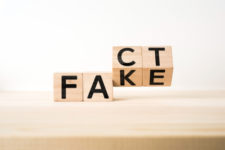Should It be a Crime to Publish Fake News?

Integrity campaigners have labelled the spread of disinformation during the recent Federal Election campaign as ‘intolerable’, and are calling for criminal laws specifically designed to deter such conduct in the future.
One campaigner, former NSW supreme court justice Anthony Whealy, says falsehoods, particularly some spread via the United Australia party’s advertising, are “unacceptable”.
The former judge is one of several voices calling for law reform that provides a renewed emphasis on fact and truth in political campaigning.
Federal election fiction
The recent election was certainly littered with false and exaggerated claims, many of which were propagated by fringe groups on social media and amplified by major parties.
As we reported before the election, one such fake story was that Labor planned to introduce a death tax, which appears to have started on unsourced Facebook pages. Other fake news claimed that Labor, the Greens and Unions signed an agreement to introduce a 40% inheritance tax”.
While some of the claims were spread directly by messenger to Facebook users, others were simply stories that gained their own momentum and were spread by users themselves.
It has been reported that the claim that Labor planned to introduce a Car Tax which would increase the cost of nearly all of Australia’s new cars, was an advertisement, paid for by the Liberal WA branch.
Labor was not entirely blameless though, it also joined the ‘false information’ bandwagon and spread fabricated information about The Liberal Party’s plans for Medicare.
The role of the AEC
The Australian Electoral Commission (AEC) was aware of the false information circulating, and in the lead up to the election asked Facebook to remove the unauthorised election content from the social media platform, but much of it had already been read and shared.
The rise of ‘fake news’
Of course, the power of social media to sway opinion has been well documented. Just a week before the US election, fake news spread via social media that presidential candidate Hillary Clinton was at the centre of a paedophilia ring. A video containing the allegations went viral on social media and was picked up by some highly credible mainstream media including CNN, the New York Times and the Washington Post. As a result, many believe that the seeds of doubt sown by the false story were enough to cost Hilary Clinton the election.
But – are reforms workable?
Previous attempts to regulate advertising have failed miserably in Australia, with concerns that they restrict free speech. In the 1980s, parliament attempted to introduce such laws before quickly repealing them.
Now, nearly 40 years later, the issue is further complicated by the proliferation of social media, and the concept of aiming to monitor and regulate content produced by millions of individual Facebook users.
However, the seriousness of the falsehoods spread in this year’s federal election campaign, which basically amount to propaganda, and the rise of rouge groups circulating fake stories on social media have given impetus to renewed calls for reform, which have been backed by politicians including Jason Falinksi for the Liberals, newly elected independent Zali Steggall and the Greens.
Should spreading fake news be a crime?
Around the globe, Germany, France, Malaysia and Canada have all passed laws which require social media platforms to remove content determined as ‘fake news’. Each has been criticised for violating free speech with censorship.
However, also around the world people are increasingly concerned about the spread of disinformation, the speed at which it can spread, and the sophistication of its presentation, which makes it difficult in many cases to determine fact from fiction.
Australian experts in the field suggest that there is scope to toughen the existing rules that prevent misleading and deceptive conduct in other, non-political advertising, which is outlined in Australian Federal Consumer Law.
These regulations make it illegal for a business to engage in conduct that misleads or deceives or is likely to mislead or deceive consumers or other businesses. The law applies even if you did not intend to mislead or deceive anyone or no one has suffered any loss or damage as a result of your conduct.
Currently, the penalties for a breach of these laws are large fines. For corporations, the maximum penalty would be the greater of:
- $10 million
- three times the value of the benefit received, or
- 10% of annual turnover in preceding 12 months, if court cannot determine benefit obtained from the offence.
And, for individuals: $500 000.







